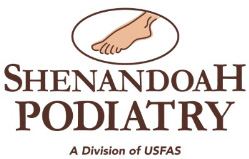 People who play sports or enjoy an active lifestyle can suffer from Achilles tendon issues, such as Achilles tendinitis, Achilles tendon rupture, and Achilles tendon or heel bursitis. If you’re having difficulty walking due to severe pain and swelling at in the back of your leg just above the heel, you may have injured your Achilles tendon. Here’s what you need to know about Achilles tendon sports injuries and how the knowledgeable and highly-skilled specialists at Shenandoah Podiatry can help you get back on your feet and back in the game.
People who play sports or enjoy an active lifestyle can suffer from Achilles tendon issues, such as Achilles tendinitis, Achilles tendon rupture, and Achilles tendon or heel bursitis. If you’re having difficulty walking due to severe pain and swelling at in the back of your leg just above the heel, you may have injured your Achilles tendon. Here’s what you need to know about Achilles tendon sports injuries and how the knowledgeable and highly-skilled specialists at Shenandoah Podiatry can help you get back on your feet and back in the game.
Understanding Your Anatomy: The Achilles Tendon
Tendons are tough bands of fibrous tissue that attach muscles to bone and the Achilles tendon is the largest tendon in the body. It runs down the back of the lower leg, connecting the calf muscles (gastrocnemius and soleus) to the heel bone (calcaneus). The Achilles tendon is what enables you to push off while walking or running. Unfortunately, an irritated or injured Achilles tendon can make every step miserable, causing discomfort, pain, and swelling, impairing your mobility, and forcing you to restrict your activities.
Common Achilles Tendon Sports Injuries
At Shenandoah Podiatry, our esteemed doctors of podiatric medicine (DPM) address a wide range of issues affecting the Achilles tendon, including:
- Achilles tendinitis. An inflammation or irritation of the Achilles tendon that causes mild to moderate pain above the heel that worsens with activity. Though not usually serious, the condition can worsen over time without proper treatment.
- Achilles tendon tears or ruptures. When overstretched, the Achilles tendon can sustain small, partial tears or rupture completely. As the tendon ruptures, people often hear an audible “pop,” which is followed by an intense pain in the back of the ankle and lower leg that’s severe enough to hinder mobility.
- Achilles tendon or heel bursitis. An inflammation of the bursa, the fluid-filled sacs located between the heel bone and Achilles tendon, this condition can cause pain and restrict foot and ankle movement.
Achilles Tendon Injury Causes and Risk Factors
Overuse is the primary cause of Achilles tendon sports injuries. Other causes and risk factors include:
- Suddenly increasing the intensity, duration, or frequency of activity
- Decreasing recovery time between physical activities
- Failing to sufficiently warm up, stretch, and cool down
- Wearing poorly-fitting shoes or the wrong shoes for the activity
- Running on hard or uneven surfaces
- Pronating excessively (rolling the foot inward upon landing each step)
- Obesity
- Poor muscle flexibility
- Playing sports that involve a lot of running, jumping, and sudden starts and stops, such as basketball, soccer, and tennis
Treatment Options For Achilles Tendon Sports Injuries
Achilles tendon sports injuries often respond well to conservative treatment methods, such as R.I.C.E. (rest, ice, compression, and elevation), temporary immobilization (cast or walking boot), and physical therapy. More severe Achilles tendon injuries, like complete ruptures, often require more advanced intervention. In some cases, surgery may be required to repair the damaged tendon. However, surgery is our last option, used only after more conservative methods fail to deliver the desired results.
Prevention of Achilles Tendon Sports Injuries
At Shenandoah Podiatry, we won’t just help you get back on your feet after an Achilles tendon sports injury, we can also advise you on how to avoid suffering the same (or a similar) injury in the future. Our recommendations may include stretching and strengthening exercises; reducing the duration, frequency, or intensity of your workouts; or opting for better-fitting, more supportive footwear when exercising or playing sports.
We Help Foot and Ankle Patients Put Their Best Foot Forward in Roanoke
Looking for high-level podiatric care provided in a calm and relaxed atmosphere that encourages healing? Look no further. Shenandoah Podiatry offers complete podiatric care, accomplished podiatrists, advanced treatment options, and an environment designed to put you at ease. Ready to see what we can do for you?
Complete our online contact form or call our office at 540-904-1458 to schedule an appointment with Dr. Jennifer Keller or Dr. Natalie Allen.
|
Related Links: |
